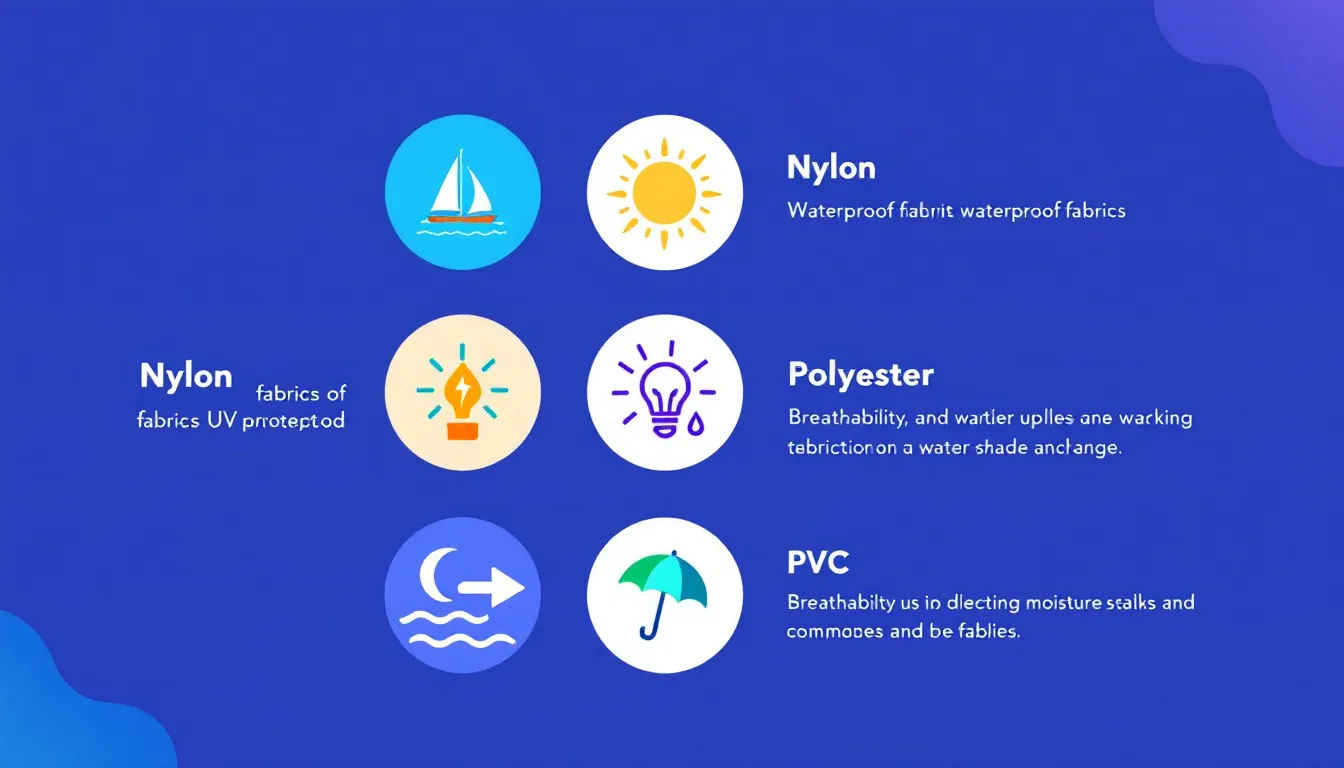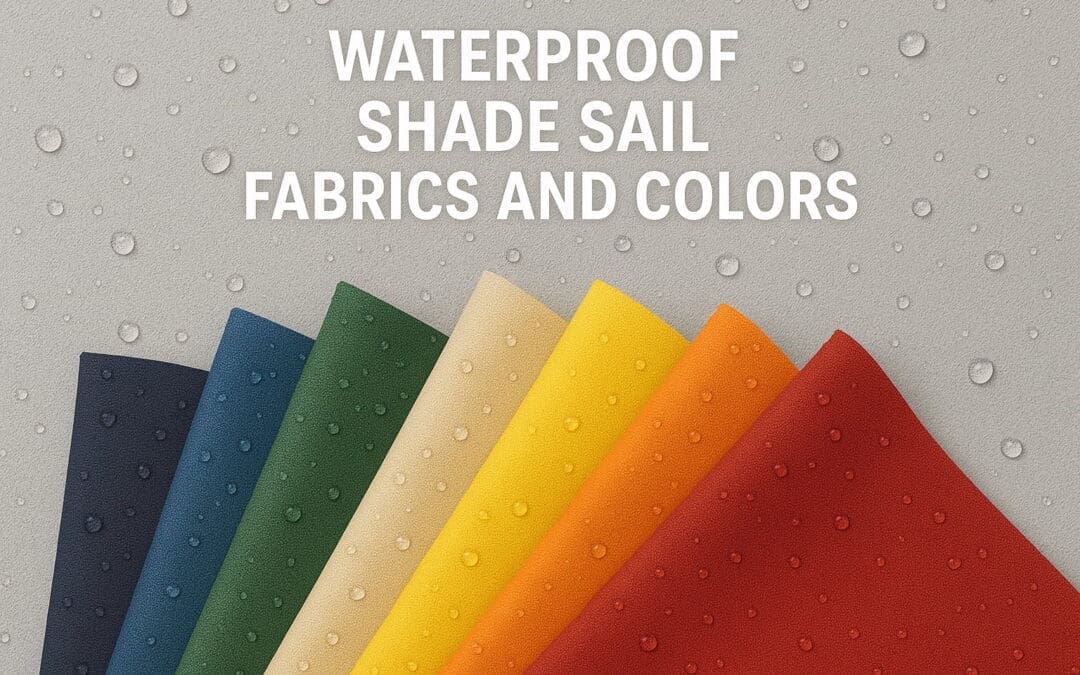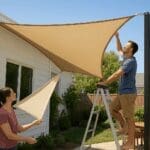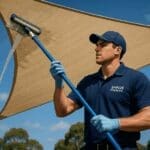Waterproof shade sails are specially designed fabric structures that provide shade and shelter by blocking sun and rain. Unlike regular shade sails, these versatile structures are made from durable and UV stabilised materials, so you get complete rain protection with premium water resistant shade sails.
Whether you’re looking to enhance a residential patio, commercial outdoor space or public park, waterproof shade sails offer year round usability and comfort by shielding against harsh weather. Not only do they provide sun and rain protection but also keep outdoor areas cooler on sunny days, making them a must have for any outdoor space. They are effective in many situations, such as pergolas and outdoor areas, so you can see how versatile and practical they are.
Types of Waterproof Shade Fabrics

Choosing the right waterproof shade fabric is key to maximum durability and performance. Many waterproof shade materials are suitable for shade sails. These include:
- Polyethylene (PE)
- Vinyl (PVC)
- Woven polypropylene (PP)
- Polyester (PES)
Each fabric has its own benefits, from cost effective to exceptional durability, weather resistance and material quality. Also consider the weight of each fabric; polyester based fabrics are lighter in weight compared to PVC fabrics, so easier to handle but less rugged. Understanding these options will help you choose the fabric that best suits your needs and preferences, as these choices matter.
Polyethylene (PE) Fabrics
Polyethylene (PE) fabrics are a cost effective option for waterproof shade sails. These fabrics are highly durable and can withstand tearing and abrasion so suitable for long term use in any weather.
Many PE fabrics are treated with uv stabilised resin to enhance their resistance to sun degradation so they remain effective in providing sun protection. However PE fabrics can be tricky to sew as they have a low melting point and professional sewing is recommended to avoid issues with needle breakage or melting.
Vinyl (PVC) Fabrics
Vinyl (PVC) fabrics are known for their high durability and fade resistance so are a popular choice for outdoor shade applications. These fabrics have a waterproof barrier that resists water ingress so will perform long term in harsh weather. Also waterproof shade cloths have a resin coating on one side which should be facing down to prevent water penetration.
PVC fabrics also retain their appearance over time as they have excellent colour retention and abrasion resistance.
PVC fabrics also retain their appearance over time as they have excellent colour retention and abrasion resistance.
Woven Polypropylene (PP) Fabrics
Woven polypropylene (PP) fabrics maintain their size and shape without shrinking or stretching so are durable for long term use. These fabrics are breathable so ventilation and reduces moisture buildup which is beneficial in humid conditions.
They may not have specific waterproof features but their quality of fading and maintaining integrity makes them a good choice for many applications even if a tear occurs in the layers. The weight of the fabric used for shade sails is often measured in grams per square metre (GSM) which indicates the strength and quality of the material.
Polyester (PES) Fabrics
Polyester (PES) fabrics are strong so are a durable option for waterproof shade sails. The high tensile strength of PES fabrics provides longevity and resilience against tearing and stress. Although they are strong they are lightweight so easier to handle and install.
The PU coating on PES fabrics enhances water resistance so effective waterproof layer. Some advanced waterproof fabric options like Ferrari 502 have a unique manufacturing process that consists of two layers, one robust protective coating and a layer of high tenacity polyester yarn.
Choosing the Right Size and Shape for Waterproof Sails for Shade
Choosing the right size and shape for your shade sail is key to maximum performance and aesthetics. This involves measuring the area accurately and accounting for tensioning space around the form anchors.
Choosing the right dimensions will give your shade sail the intended coverage and look of your outdoor space.
Triangle Shade Sails
Triangle shade sails are a popular choice for smaller outdoor areas due to their versatility and ease of installation. Their three point design allows for creative placement and overlapping configurations so are ideal for irregular or compact spaces. Triangle sails provide a modern look and can be combined to create larger shaded areas.
Square Shade Sails
Square shade sails offer broader coverage than triangular sails so are suitable for medium sized outdoor areas. Their four point attachment system provides stability and even tension so helps maintain the sail’s shape over time. Square sails are perfect for patios, decks and garden spaces where a balanced symmetrical shade is required.
Rectangle Shade Sails
Rectangle shade sails are designed to cover large areas so are ideal for commercial situations and big outdoor spaces. Their elongated shape allows for covering long spaces such as walkways, carports or large seating areas. Rectangle sails provide excellent sun and rain protection especially when combined with a slight slope to prevent water ponding.
Custom Solutions
Custom made shade sails are beneficial for unique spaces that require specific dimensions or designs to achieve optimal shade and style. These tailored designs ensure a perfect fit and optimal functionality without compromising on design so are ideal for irregular spaces.
Key Features to Consider When Choosing Waterproof Sails for Shade
When choosing waterproof sails for shade it’s important to consider several key features that impact its performance and longevity. These features include:
- UV protection
- Durability and weather resistance
- Colour options
- Installation and maintenance requirements
Understanding these will help you choose a shade sail that meets your specific needs and will last long term. Also selecting durable materials and building a strong framework for your shade structure is crucial for withstanding environmental elements and enhancing both functionality and longevity.
UV Protection
UV protection is a key feature for shade sails as it enhances their ability to block out sun rays. Choosing UV stabilised resin in shade sails ensures they provide excellent protection against ultraviolet rays so protect both users and the fabric itself.
Blocking out sun rays, waterproof shade sails reduce outdoor temperatures so make your outdoor space more comfortable. Also note the difference between waterproof and water resistant materials. While waterproof shade sails can repel water completely, water resistant shade sails can handle light showers but may eventually let water through.
Durability and Weather Resistance
Durability and weather resistance is key to your shade sail withstanding extreme weather conditions. Materials like PVC are preferred for their robustness against harsh weather elements like strong winds and heavy rain.
While PE fabrics are cost effective they can become brittle with prolonged exposure to the elements. Woven PP fabrics allow airflow while still providing excellent water resistance and PES fabrics with a PU coating enhance their water repellent capabilities. Also make sure to use waterproof shade cloth in sloped applications to prevent water holding issues which can damage the material if not properly tensioned.
Colour Options
Shade sails come in many colours so you can personalise while also affect heat absorption and light reflection. The colour you choose will affect the look of your outdoor space and overall design.
Choosing the right colours can make a big difference to the functionality and look of your shade sail.
Installation and Maintenance
Proper shade sail cleaning and maintenance is key to the longevity and performance. The minimum fall or slope for installing waterproof shade cloth is 20 degrees to prevent water pooling which can damage the sail and void the warranty.
Facing the resin side down and regular inspections helps maintain the integrity of the shade sail especially under windy conditions so it’s not exposed to unnecessary wear.
Conclusion
Choosing the right waterproof sails for shade involves understanding the different types of fabrics, considering key features like UV protection, durability and colour options and following the installation and maintenance guidelines. Whether residential, commercial or public use these versatile structures provide year round protection and outdoor comfort. Investing in waterproof shade sails is a cost effective solution that offers long term benefits so your outdoor space is more enjoyable and functional no matter the weather. Get the transformative power of waterproof shade sails and create outdoor spaces that can be enjoyed all year round.
Frequently Asked Questions
What are waterproof shade sails made of?
How do I choose the right size for my shade sail?
Can shade sails withstand strong winds?
Yes, shade sails can withstand strong winds if they are properly tensioned and secured with robust anchors and support structures. This ensures they remain stable and minimize the risk of damage.






